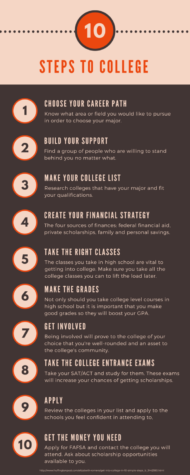Senior Angelo Perez fights the uneasy feeling boiling in his stomach before he walks on stage to perform. With hands like ice and weak knees, he finger-picks his guitar to calm his nerves before 400 eyes stare holes right through his chest.
Although he wasn’t confident in himself at the time, Perez has considered a career in music since he started playing at seven years old. He doesn’t care what career he has in the industry, as long as he stays around what makes him the happiest. However, with the stress of money, scholarships and making the grades, it can be difficult to keep a positive mindset.
“Music is kind of my niche and something I feel that is special to me,” Perez said. “It is sort of liberating and a stress reliever, something that makes me happy.”

First, choose a career path. High schools now ask students to know what career they think they would like to pursue going into ninth grade. Because students haven’t been open to the opportunity of taking high school electives or Ben Barber classes, they may become confused of what they are interested in pursuing. However, according to Legacy counselor, Ms. Angela Julius, allowing students to have an idea of what they would like to do can make a huge impact.
“I think choosing in eighth grade allows the student the benefit of time,” Ms. Julius said. “If the student begins courses in the endorsement area he or she chooses and does not enjoy the coursework, he or she has time to make changes.”
After deciding a career path, research which colleges would be the best suited for that major. University counselors are a great resource for help on picking a major. Perez continues to receive acceptance letters from colleges but dreams to attend UCLA.
“I don’t think you have to go too far for a full college experience,” Perez said. “I want to go to UCLA because everyone in LA has big dreams.”
Finding a support system helps further your education. Friends, family, teachers and counselors are an important part of helping guide your future. Senior Isaiah Jones plans to attend Texas State University in the fall and knows the importance of his mom’s influence on him.
“Since I was in about fifth grade she has been preparing me to be an adult,” Jones said. “She has always been the best support.”
The biggest factor in preparing for college starts your freshman year. Starting with a solid GPA ensures ending your high school year with one. In the state of Texas, many colleges have automatic acceptance for students in the top ten percent of their class or have high SAT/ACT scores.
“The most stressful part about trying to get into college is keeping my GPA and ACT/SAT high so I can get looked at by good schools,” Jones said. “School isn’t hard if you don’t procrastinate and just do your work when it’s assigned.”
Making the grades determines the journey that lies ahead. Getting into an Ivy League School means no room for slack. Also being said, college isn’t for everyone. The stress high school seniors undergo worrying about getting their projects in on time or staying until 6 p.m. for band on school nights doesn’t begin to compare to the weight of working for a college degree.
“It is going to be hard. There will be classes that are difficult where you will question your decision for that particular major. Stay the course if at all possible,” Ms. Julius said. “These challenges will help you grow as a person, student, and potential employee later in life.”
To keep from feeling stressed and unsure about the next step, keep up with coursework and take the proper steps to prepare for college. Ms. Julius believes every student deals with grades and classes in different ways. GPAs and test scores don’t determine worth or success.
“Please do not compare yourself to other students. Where they are going, how many hours they have obtained, what their GPA is, when you are going to graduate in comparison to your peers,” Ms. Julius said. “Everyone is on a different path with different factors affecting that path. Some move on to work, some move on to grad school. This is what makes us all unique.”




